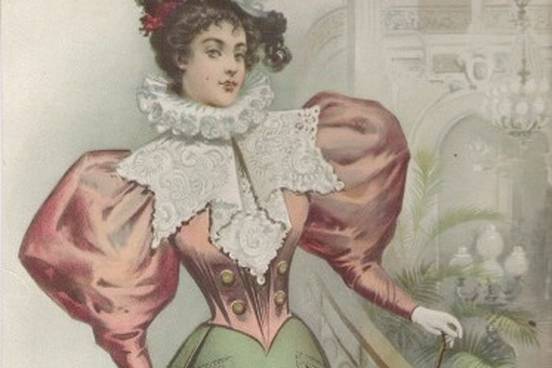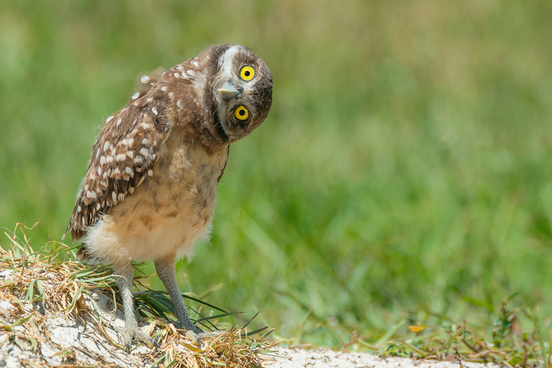
Flummadiddle
Definition: something foolish or worthless
Flummadiddle is the sort of word that rolls nicely off the tongue, and even if people with whom you use the word don’t quite know what it means the conversation will be the richer for its presence. It has gone through a number of meanings and spellings since it first began being used in the early 19th century, with the earliest use apparently referring to a frill or fringe, as found on a dress.
… looking down, found I had disarrayed my fair partner of lots of roses, and two yards of flounce or flummediddle, which skirted the lower part of her dress.
— Ichabod, Boston Lyceum, March 1827My stature is neither of predominating height, or insignificant brevity, and having observed that a redundance of ‘flemmediddle’ (as it is now called) is tolerable only on a lady of the first dimensions, and that a dress for the street without any addition of ornament looks rather a la Cinderella, or like a morning habiliment, a neat, appropriate trimming will be visible upon whatever I may wear, of my own work, (what a sneer, Miss Araminta! sneers do not become ladies, gentlemen may sneer as much as they please,)….
— Boston Spectator and Ladies’ Album, 21 Apr. 1827
Following its sartorial beginnings, flummadiddle began to be employed in other fashions; it comes up as a single-word headline for an article in a Massachusetts newspaper, The Salem Gazette, in 1829, without any apparent relation to the text of the article (which is about a walking stick); perhaps the editors of that paper simply liked the way the word looked.
By the middle of the 19th century flummadiddle was used variously as a verb or as an interjection:
L. (Jumping up.) Jupiter! thunder! a tete-a-tete with a vengeance! O, you etarnal varmint of a bat—I’ll show you how to flumadiddle around me!
— Spy-Glass, July 1840O folly, fudge, and flummadiddle! We shall wait and see what next.
— Milwaukee Daily Sentinel, 18 Aug. 1848
In the 1840s it settled down a bit, and began to see service in the role that it was obviously born to play, which is as a synonym for fiddle-faddle, folderol, or flapdoodle.
The threat about retaining all Mexico is mere flummadiddle, of course.
— Boston Daily Bee, 8 Oct. 1846

Slumgullion
Definition: a meat stew
Slumgullion is a nasty-sounding word, and for most of its time on earth it has been what we might refer to as eponymous (“suitably named”), for the things it has described have been similarly unpleasant. Prior to describing a meat stew the word had been used to refer to “an insipid drink,” “the mixed blood, oil, and salt water that collect on the decks of a ship while the valuable parts of a whale are being handled,” and several other unfortunate things.
It is not entirely clear which meaning of slumgullion came first, although it seems possible that it was the one having to do with a disagreeable drink, as there were newspaper reports in the early 1850s of a town with the curious name of Slumgullion Bar.
The word also appears to have had some currency in the 19th century, little-remarked upon by dictionaries, as a synonym of “nonsense,” as seen in the alliterative headline from The Cincinnati Enquirer in 1875: “Hifalutin Legal Hogwash, and Slobbery, Sentimental Slumgullion About That White-Souled Woman.”
“That his speech will abound in scurrillity and falsehood we are aware, judging from the one delivered in Sacramento and San Francisco, in which the Union and the Bulletin were literally covered with filth from the slum-gullion of his mud-valve.”
— Santa Cruz (California) Weekly Sentinel, 17 Aug. 1866

Katzenjammer
Definition: a hangover
The word katzenjammer had been in use for close to a century before it was appropriated as part of the name of an early 20th century comic strip, The Katzenjammer Kids. Our earliest evidence of its use, from 1834, very helpfully provides an explanation of the word’s German origins: the cat’s misery. It is, we must admit, somewhat opaque to us what cats (or their misery) have to do with hangovers, but we must also admit that it is nicely poetic.
Among the exceptions—the many exceptions, I should say, to the unfascinating description I have given, I had the pleasure of being acquainted with one, who was neither drinker nor fighter, who never suffered under the laws of the heib comment, the stitch-comment, or the knuppel comment (the cutting, the stabbing, or the cudgelling modes of duelling;) nor ever experienced the katzenjammer (the cat’s misery) of growing sober after a debauch.
— Newbern (North Carolina) Spectator and Political and Political Register, 15 Aug. 1834

Hornswoggle
Definition: to trick or deceive someone : bamboozle, hoax
The origins of hornswoggle are unknown; as is occasionally the case with such words it has been supposed that it was a fanciful creation, rather than one wrought of the bones of some other language. The earliest written use of the word that we know of comes from an 1829 article on Americanisms published in the Virginia Literary Museum and Journal of Belles Lettres, Arts, & c., in which it is given the charming definition of “to embarrass irretrievably.”
This same article provides examples of a number of other linguistic specimens that were thought to be particular to North America in the early 19th century, several of which are worth repeating: honeyfuggle (“to quiz, to cozen”), mollagausauger (“a stout fellow”), and coudeript (“thrown into fits”).
The trick to be played
Was to hornswoggle Grant,
Although what was said
Was but buncombe and rant!
Though Greeley wasn’t there he’d a hand
And furnished the most of the cant.
— Steuben County Republican (Angola, Indiana), 12 June 1872

Highfalutin
Definition: pretentious, fancy
Highfalutin has a fine purpose, which is that it serves to describe behavior that is pretentious without making the person using it sound, well, pretentious. Were you to describe the high-flown speech of another using other adjectives available to you (grandiloquent, fustian, orotund) you might well be found guilty of the crime yourself.
Highfalutin appears to have first been used in print in the US in the 1830s, and in its earliest instances was typically written as high faluting.
They didn’t play “Old Zip Coon on a rail,” or sich like, but they were going it on the high faluting order. I heerd one slick-cheeked chap, what was sitting behind me, singing as they were playing.
— Spirit of the Times, 2 Feb. 1839

Sockdolager
Definition: something that settles a matter : a decisive blow or answer
There have been more than a few theories advanced as to the origins of sockdolager, ranging from a translation of some Latin phrase to a combination of sock and doxology. While anything is possible, we must caution readers that the majority of popular etymologies that have a charming and fanciful origin story are little-rooted in fact. Given that sockdolager appears to have appeared in print as a highly colloquial term in the 1820s, and has had more spelling variants than it has letters, it is unlikely that its true origins will be made clear anytime soon.
But Mr. Croswell does not believe Mr. Adams’ word. What a pity! This is what the vulgar call a sockdologer; and Mr. Adams must be a free mason, nolens volens, without the help of a lodge or a gridiron.
— Commercial Advertiser (New York, NY), 29 Sept. 1828

Slantindicular
Definition: somewhat oblique
Slantindicular sounds a bit similar to a good number of other fanciful 19th century Americanisms on this list, and much like several of them it is a portmanteau. A portmanteau may refer to a large suitcase, or to a word that is formed by blending two or more distinct forms. One of the better-known portmanteaus (or portmanteaux) is smog, which is a blend of smoke and fog. Slantindicular, which is not one of the better-known portmanteaus, is a blend of slanting and perpendicular.
So he looked up at me slantindicler, and I looked down on him slantindicler—he took out a chor o’ tobaccer and, says he “I dont vallee you tantamount to that!” and then the varmint flapped his wings and crowed like a cock.
—United States Telegraph (Washington, D.C.), 6 Oct. 1831

Jimberjawed
Definition: having a projecting lower jaw
Jimberjawed (also occasionally found as gimberjawed, jibberjawed, jiggerjawed, jimmiejawed, among other variations) is thought to be a variant of gimbal-jawed, which means much the same thing (a gimbal is a device that allows a suspended body to incline freely in any direction).
This word should not be confused with cold-jawed (“obstinate”), flap-jawed (“talking excessively or indiscreetly”), iron-jawed (“rigorously determined”), or slack-jawed (“having the lower jaw dropped especially as indicating amazement or stupidity”). And it should never, ever be confused with wapper-jawed (“having a crooked, undershot, or wry jaw”).
“May I be tetotally twisted if I can’t ram-squaddle two like you, you jimber-jawed rascal.” “Gouge him—chew him up.” Here the noise increased to such a pitch, that the Englishman thought all the imps of the lower regions were let loose upon him.
— Alexandria (Virginia) Gazette, 11 Sept. 1830

Bodacious
Definition: very good or impressive
Bodacious has both been around for far longer than one might assume (the word enjoyed a somewhat increased popularity following its repeated use in the 1989 film Bill and Ted’s Excellent Adventure); this word and the adverb form, bodaciously, have been in use since the early 19th century. The original meaning of bodacious was somewhat different than the one which was intended when used by the titular heroes of the aforementioned movie; the first sense we have for bodacious is “outright, unmistakable.” The senses of bodacious that are in common use today (“excellent” and “attractive”) do not appear to have been used until the latter portion of the 20th century.
“Ah doctor Geeho, you never seed sica a poor afflicted creature as I be, with the misery in my tooth; it seems like it would jist use me up bodyaciously.”
— James Hall, Bouquet: Flowers of Polite Literature, 8 Sept. 1832

Absquatulate
Definition: to depart suddenly; to abscond
In 1830 a newspaper in North Carolina, the Newbern Sentinel, ran an article about an unpublished dictionary, titled The Cracker Dictionary. The work appears to have remained unpublished (perhaps the title had something to do with this), but in reporting on the words contained in the book’s nascent form the article provides early written evidence of a number of 19th century Americanisms. Among these is absquatulate, which is spelled with an initial O, rather than A, and defined as “to mosey, or to abscond.”
In addition to absquatulate, the reader is informed of the meaning of a number of other similar terms, many of which have retained some degree of currency in our language; flustrated (“frustrated and prostrated, greatly agitated”), rip-roarious, (“ripping and tearing”), and fitified (“subject to fits”) have seen enough continued use that we define them in our Unabridged Dictionary. Other words contained in this never-realized dictionary, such as ramsquaddled (“rowed up salt river”) and spontinaceously (“of one’s own accord”) appear to have been lost with the passage of time.
Two of the loafers, we understand, were yesterday taken and committed to prison; the other has absquatulated.
— The Times-Picayune (New Orleans, Louisiana), 13 June 1837






